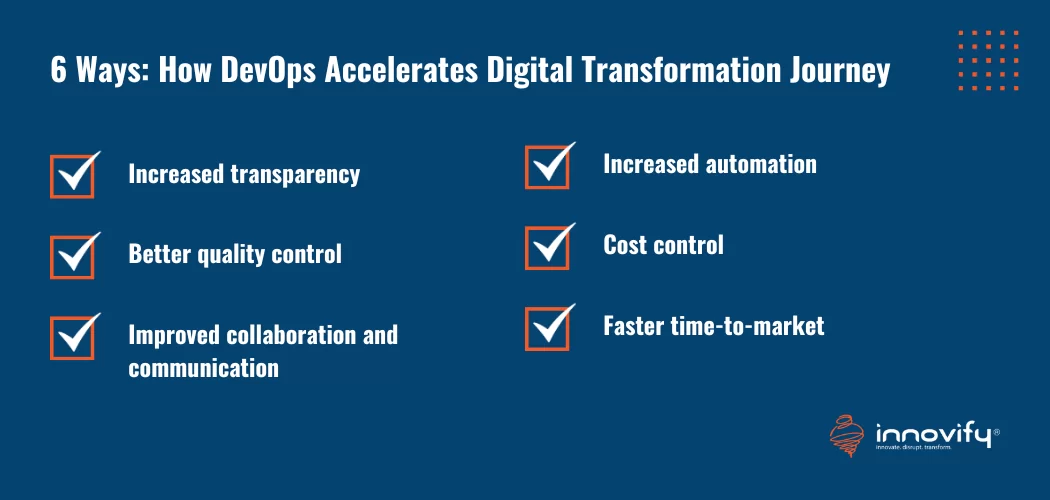AI/ML
How DevOps Accelerates Digital Transformation Journey?
How DevOps is Useful in Digital Transformation
Enterprises looking to go digital face many challenges along the way. The transformation process can be complex, time-consuming, and costly.
But what if we told you there’s a solution that can help streamline the process, minimize disruptions, and increase efficiency? That solution is DevOps.
As a leader in digital transformation, we understand the importance of having a solid foundation for successful digital transformation. And DevOps is the cornerstone of this foundation. DevOps helps to bridge the gap between development and operations, allowing for a more streamlined and efficient process.
DevOps as a service enables organizations to implement and manage a DevOps strategy without the need for in-house expertise, facilitating digital transformation by streamlining software development and deployment processes.
For example, imagine an enterprise that wants to roll out a new digital product. With traditional methods, this process can take months and require multiple departments to work in silos. But with DevOps, the development, testing, and deployment can all occur more quickly and seamlessly. This results in a faster market time and a higher quality control level.
In this blog, we’ll explore the role of DevOps in digital transformation and how it can help enterprises achieve their digital transformation goals.
So, let’s get started!
DevOps: An Overview
DevOps is a methodology that focuses on close collaboration, open communication, and seamless integration of the development and operations teams in software development. It’s a cultural movement that aims to bridge the gap between these two teams, promoting the idea that they are not separate entities but rather part of a more extensive, interdependent system.
DevOps helps to automate the software development lifecycle, from development to deployment and everything in between. This includes continuous integration, delivery, and deployment, among other practices.
A 2019 survey by Upguard found that adopting DevOps allowed 63% of companies to increase the frequency of their software releases.
DevOps aims to speed up the development process, reduce errors and downtime, and improve the overall quality of software. This is achieved through tools & technologies and practices that help teams work together more effectively, automate repetitive tasks, and quickly identify and resolve issues.
By adopting a DevOps approach, organizations can increase their software delivery process’s speed, efficiency, and reliability. This can lead to improved customer satisfaction, increased innovation, and a competitive advantage in the marketplace.
DevOps in Digital Transformation
The key to digital transformation is understanding the customer and building products or services that meet their needs.
But what happens when customers can’t articulate those needs? How do you know if your product is meeting their expectations?
DevOps in digital transformation can address these challenges by providing a feedback loop between development and operations teams so that they’re working together to deliver an optimal customer experience.
In this way, DevOps helps organizations understand how their products are being used, enabling them to make changes based on real-world feedback rather than guesswork.
6 Ways DevOps Accelerates Your Digital Transformation Journey

DevOps plays a critical role in digital transformation by helping organizations rapidly and continuously deliver high-quality software. In a digital world, quickly and effectively delivering software updates and new products is critical to staying competitive.
Here are 6 ways how DevOps aids the digital transformation process:
1. Improved collaboration and communication
As technology becomes ever more intertwined with business, cultivating an environment where employees can easily collaborate and share information has become more important than ever.
This is where DevOps comes in. DevOps brings together operations and development teams to make software development more flexible, efficient, and accountable. It involves breaking down silos between different business units and departments within an organization so that they can work together more effectively.
For example, DevOps can help you reduce the time it takes to deliver new features or release new products by making sure developers have access to the latest code from their peers working on other projects, thus eliminating the need for them to build everything from scratch every time they start a new task or project.
As a result of these improvements in collaboration, DevOps allows for more rapid delivery of applications and services to customers. Companies can respond to changing market conditions more quickly than ever before.
2. Increased automation
Automation is a critical aspect of digital transformation as it helps to streamline processes, reduce manual efforts and errors, and improve efficiency and speed. With DevOps, organizations can automate various software development and delivery stages, including build and deployment, testing, and infrastructure management.
Automation helps minimize the time it takes to develop, test, and release software, leading to a faster time-to-market and more frequent releases. Moreover, DevOps helps automate the monitoring and maintenance of applications and infrastructure. This helps organizations quickly identify and resolve issues and ensure the high availability of applications.
Automation also helps to ensure consistency and reliability of deployments, reducing the risk of human error and ensuring that the right configurations are in place.
In addition, DevOps makes it possible to automate compliance and security checks, reducing the risk of security breaches and ensuring that applications meet regulatory requirements. This helps organizations meet the demands of an ever-changing business landscape and stay ahead of the competition.
3. Better quality control
In a DevOps environment, the development and operations teams work closely together, leading to better collaboration and communication. This results in a more streamlined software development process with fewer handovers, reducing the risk of errors, and ensuring that applications meet quality standards.
With DevOps, continuous testing and continuous integration and delivery (CI/CD) practices are in place, ensuring that applications are thoroughly tested and validated before release. This helps to catch and resolve issues early in the development process, reducing the risk of defects and ensuring high-quality applications.
DevOps also helps to implement continuous monitoring and feedback mechanisms, which provide real-time insights into the performance of applications and infrastructure. This helps organizations quickly identify and resolve issues, improve the quality of applications, and enhance user experiences.
In addition, DevOps promotes the use of automation and orchestration tools, which help organizations standardize and streamline the deployment process. This results in fewer manual errors and reduces the time it takes to deploy applications, leading to improved quality control.
4. Cost control
Cost control is a key component of any business. Still, it’s especially important in the digital age because it’s easy to lose track of spending when working with new technologies and different teams.
Continuous integration and continuous delivery (CI/CD) gives you more up-to-date information about what’s happening in your environment at any given time.
If there are problems with one part of your system, you’ll know immediately so that you can fix them quickly and prevent further damage from happening.
5. Increased transparency
As mentioned above, DevOps helps organizations understand how their products are used. This information allows them to make informed decisions about which features need improvement or expansion and which features are no longer relevant.
The more transparent an organization becomes about its processes, the easier it is for everyone to understand how things work. This means there will be fewer surprises when something goes wrong and less time wasted trying to figure out who should fix problems or where they originated.
Transparency also means there’s less room for blame games or finger-pointing when something goes wrong because everyone knows exactly what’s happening at all times. This leads to greater accountability—which means fewer mistakes are made—and employees who feel like they have a voice in their workplace.
This type of transparency leads directly to better customer satisfaction and loyalty, both key goals of digital transformation efforts.
6. Faster time-to-market
DevOps is useful for digital transformation because it allows organizations to respond more quickly to customer needs and changing market conditions. When you have an agile team that can provide new features more quickly, you’re able to improve the customer experience, which is one of the key goals of digital transformation.
By using practices such as continuous integration, continuous delivery, and continuous deployment, DevOps helps organizations quickly and reliably deliver new software features and updates to the market. This results in a faster time-to-market and improved competitiveness in the digital landscape.
Faster time-to-market means that your company can bring new products and services to market before competitors do. It gives you an advantage over them in gaining new customers or retaining existing ones.
Unlock the potential of Digital Transformation with DevOps
DevOps is a critical component of digital transformation stages, enabling organizations to move faster, deliver higher quality products and services, and improve efficiency, communication, and collaboration between development teams.
Are you ready to take your digital transformation to the next level?
Let Innovify be your DevOps partner and help you achieve your goals faster than ever before. Our team of DevOps experts has the expertise and experience to meet all your requirements and guide you through every step of the process. Contact us today and see how we can help you reach your DevOps milestones quickly!
FAQs
1. Why is DevOps important in the digital era?
DeveOps enables organizations to quickly and efficiently respond to the constantly evolving needs of customers in a fast-paced digital landscape. By integrating development and operations, organizations can improve their ability to deliver high-quality software products and services.
2. Is DevOps a digital technology?
DevOps is not a digital technology but a cultural and professional movement that has emerged in response to the digitalization of the business world. DevOps involves the use of a variety of digital technologies, including cloud computing, automation tools, and continuous integration and delivery tools, but its main focus is on improving the collaboration and communication between development and operations teams, as well as speeding up the software development lifecycle.
DevOps and cloud computing are two key drivers of digital transformation, allowing businesses to quickly and efficiently build, deploy, and scale their applications to meet the changing demands of the modern marketplace.
3. What are the DevOps security best practices?
DevOps security best practices include incorporating security measures into the development pipeline, such as automated security testing, continuous monitoring, strong access controls, and encryption protocols.




